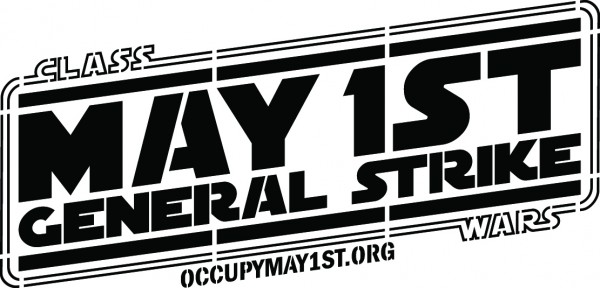Tomorrow on May 1, Occupy Wall Street has endorsed calls for a nationwide general strike to shut down business as usual on a traditional day of labor activism. Here's how MayDayNYC describes the call:
It's a day for recognizing that we are all workers, whether we're rank-and-file union members, the precariously employed, students, or stay-at-home parents. It's a day to recognize the value of our work, and the power we have to collectively change our working conditions and our world. By simply stepping out of the systems of production that confine and divide us, we can transform the conditions of society itself. May 1st is a day to explore the possibility of communities based on mutual aid rather than exploitation and consumption.
I think the general strike so conceived is a geat idea, and not least because of the questions it raises about current work arrangments. As a writer committed to the Occupy sequence, I've been involved in more than just reporting what occurs. I've thought of my work (even the work I get paid for, like this post) as furthering the struggle as described in the call. But to work during a strike, even if well-intentioned, is to be a scab and to undermine the solidarity required for that kind of collective effort. Think about the day the internet went black to protest SOPA/PIPA; even sites dedicated to protecting internet freedoms shut down their sites because the total effort was more important than any individual's daily work.
Lots of writers are having similar questions, and I heard from a few friends in a similar situation about what they're doing.
-
Natasha Lennard who covers Occupy for Salon (and was arrested as a journalist for the NY Times on the Brooklyn Bridge) said, "On May Day, I'm living, not recounting. I'm not retelling the experience of general strike to myself or to others through livetweeting." As one of the more high-profile journalists covering the sequence, Lennard's choice to respect the call should put some pressure on other writers who don't want to be seen as benefitting parasitically from other people's solidarity.
-
Nathan Schneider, who has covered Occupy for Harper's and edits Waging Nonviolence, also won't be filing or tweeting on Tuesday, though he concedes it's a complicated situation: "it's what I think is so interesting about this general strike; we all have to find the right ways to participate, given our situations, our goals, and our adversaries."
- Adam Rothstein, who helps produce Occupy Portland, is going to be publishing tomorrow, partly as a safety measure: "Part of going on strike is securing the safety of those exercising their right to strike, against those that would stop them. In reporting about the strike, our media group keeps the information flowing, as a defensive measure, as part of the strike."
It's easier for me as a freelance writer to strike for a day than almost anyone else paying their own rent, but it's not quite that simple. I won't be filing any stories from the demonstrations tomorrow, but what about tweets? Tweets are a crucial organizing tool for figuring out what's going on as it happens, to help set the narrative early, and to let loved ones know you're okay when they're hearing reports of occupiers getting hit by police. But tweets also produce value for a company that we don't get any piece of. That is, they are work. I'm learning that the hard way these days.
Having weighed my options, I'm going to try to resist my now severe addiction to shouting into the abyss 140 characters at a time tomorrow. "No one and nothing works" (as the slogan goes) definitely includes profitable social media, even if we have some sort of twisted codependent relationship with them. So I'll see you in the streets tomorrow. Only in the streets.









